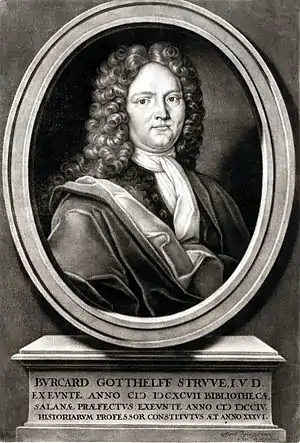Burkhard Gotthelf Struve
Burkhard Gotthelf Struve (26 May 1671 - 25 May 1738) was a scholarly German librarian who became a polymath-historian based, for most of his academic career, at the University of Jena.[1][2]
Burkhard Gotthelf Struve | |
|---|---|
 engraving: Christoph Weigel the Elder, ca. 1704 | |
| Born | 26 May 1671 |
| Died | 25 May 1738 |
| Alma mater | University of Jena |
| Occupation(s) | Historian Librarian University teacher |
| Spouse(s) | 1. Anna Elisabeth Bertram 2. Anna Elisabeth Stender 3. Marie Sophie Kettner (a widow, born Marie Sophie Hansen) |
| Parent(s) | Georg Adam Struve (1619-1692) Susanne Berlich |
Life
Struve was born in Weimar, his mother's second son. His father, who also had a family from a previous marriage, was a lawyer and at the time of his birth a Privy counciller (Hofrat) at the court in Weimar, Georg Adam Struve.[1] The father had held a teaching professorship at Jena since 1672, and the son received his early schooling privately, some of it at home.[1]
When he was just 16 Burkhard Gotthelf Struve enrolled at the University of Jena where he learned about philosophy, politics, history and jurisprudence.[3] His teachers included J. J. Müller , J. A. Schmidt and G. Schubart, although sources stress that he had been a bibliophile from an early age, and where he did not agree with his teachers he would undertake his own research, so that in many matters he was self-educated even in respect of his time at university.[1] After Jena he spent a period at Helmstedt, learning from the charismatic Heinrich Meibom. Subsequently, he studied briefly at the Viadrina University at Frankfurt,[3] before returning to Jena in 1690.
At home there was further discussion about the direction of his future career. Early in 1691 he moved to Halle where he worked in a law firm, but the work did not suit him and he returned home at Easter. Meanwhile, his elder brother was building a career at The Hague as a Chemist and Alchemist, working for wealthy individuals, and invited Burkhard to join him as an assistant.[1] In The Hague he was able to buy a number of rare books, but then he fell seriously ill and had to leave his brother and return home to Jena.[1] The search for a career resumed, punctuated by bouts of serious illness and, in 1692, the death of his father.[1] His alchemist brother found himself in trouble, accused of dishonesty and imprisoned. Struve was obliged to sell his by-now valuable book collection and sacrifice his paternal inheritance in order to ensure his elder brother's freedom.[1]
In 1697 Struve accepted a post as University Librarian at Jena, for an annual salary of 44 Gulden.[3] He quickly irritated the university teaching staff with his habit of delivering private lectures on German History: these were popular with students.[3] In 1702 he received his doctorate, and the same year the university gave him a teaching certificate.[3] In 1704 he was appointed a professor of history at the University of Jena. Over the next few decades his reputation and eminence grew. In 1712 he was nominated "Sachsen-Weimarischen Rath Historiographus" In 1730 he received the title "Hof-Rath des Hoch-Fürstlichen Sammt-Hauses Sachsen", also adding a professorship in Civil and Contract Law.[3] On three occasions, in 1712 1720 and 1732, he enjoyed the office of University Rector, occupying the office on each occasion for the summer semester.[3]
Burkhard Gotthelf Struve died unexpectedly on 25 May 1738. In Zedler's Great Universal Lexicon in 1744 he was eulogised as one of the greatest polymaths of his time.[3]
Published output
Most of Struve's posthumous reputation rests on his published output. His four volume history first issued in 1712, and subsequently expanded and reissued as "Corpus historiae Germanicae a prima gentis origine ad annum usque 1730" was popular, also appearing in German as the "Erläuterte teutsche Reichs-Historie".[4] Three centuries later, it offers intriguing contemporary insights, without being filtered through the prism of nineteenth century nationalism and Prussian hegemony, into the nature of the German self-identity in the Holy Roman Empire.[3]
The work is ambitious in scope, covering in four volumes the history of the German lands from the pre-Roman period to the eighteenth century. The first volume covers the pre-Roman years "in the free German land" ("das freye Teutsch-Land"). It is relatively generalised and short, comprising just 58 paragraphs, and it leans heavily on Tacitus.[3] The second volume deals with the period under Roman rule, starting with the invasions of Julius Caesar and lamenting the failure of the Germans to hang together, which is a recurring theme throughout the four volumes. The third volume covers the emergence and dominance of the Franks, and the fourth volume covers the imperial centuries, beginning with Otto I.[3]
References
- Paul Mitzschke (1893). "Struve: Burkhard Gotthelf St., Polyhistor, besonders Historiker, geb..." Allgemeine Deutsche Biographie. Bayerischen Akademie der Wissenschaften. pp. 671–676. Retrieved 3 June 2016.
- Johann Heinrich Zedler (1744). "Struve, Burkhard Gotthelf". Grosses vollständiges Universal-Lexicon. p. 1096. Retrieved 3 June 2016.
- Joachim Mohr (June 2016). ""Erstlich das freye Teutsch-Land"... Auf der Suche nach einer Nationalerzählung: Wie der Historkier Burkhard Gotthelf Struve 1712 die deutsche Geschichte sah". Das Reich der Deuschen 962-1871: Eine Nation Entsteht. Der Spiegel: 102–103.
- Burkhard Gotthelf Struve (1720). "Erläuterte teutsche Reichs-Historie". Bayerische Staatsbibliothek, München. Retrieved 3 June 2016.